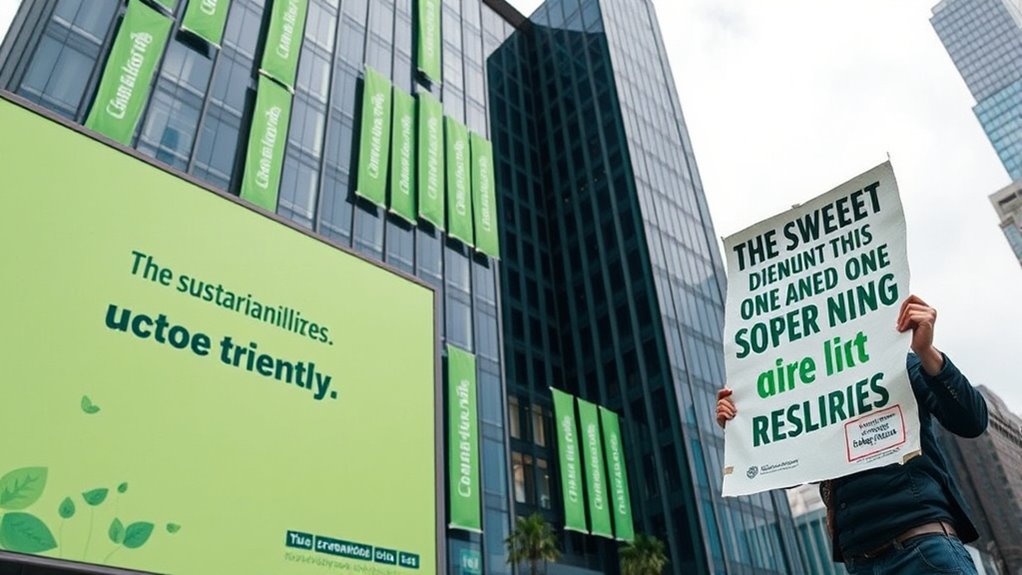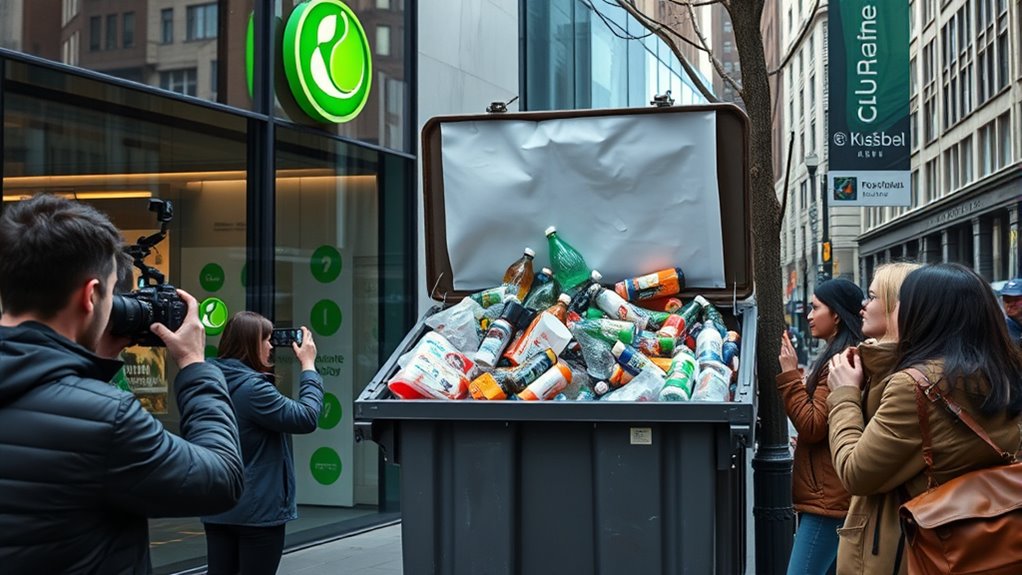When you promote false sustainability claims, greenwashing can backfire quickly, damaging your credibility and eroding consumer trust. Customers are increasingly aware and skeptical, and once they spot dishonesty, your brand’s reputation can suffer long-term harm. You could face legal issues or public backlash, making genuine transparency and authentic eco-labeling critical. If you want to avoid these pitfalls and build trust, it’s essential to understand how transparent sustainability practices protect your brand’s future.
Key Takeaways
- When companies falsely claim eco-friendly practices, consumers quickly detect the inconsistency, leading to loss of trust and credibility.
- Public exposure of greenwashing scandals can result in legal action, regulatory fines, and long-term reputational damage.
- Greenwashing backfires by damaging brand reputation more than transparent, genuine sustainability efforts.
- Social media and watchdog groups amplify greenwashing incidents, intensifying public backlash and consumer skepticism.
- Authentic transparency and credible eco labels help prevent backfires and reinforce genuine corporate responsibility.

Have you ever wondered how brands can stand out while making a positive impact on the planet? It’s a question many companies grapple with as consumers become more environmentally conscious. The answer lies in genuine sustainable branding—demonstrating corporate responsibility and earning consumer trust through honest practices. When done right, sustainable branding not only elevates your brand’s reputation but also fosters long-term loyalty. But when companies try to cut corners or falsely market their environmental efforts, it backfires spectacularly, especially if they indulge in greenwashing.
Greenwashing is a risky game. When you promote your brand as eco-friendly without substantial proof, you risk losing credibility once consumers catch on. That’s where transparent eco labeling becomes essential. Eco labeling is a way to clearly communicate your environmental commitments, allowing consumers to verify your claims easily. Labels like “organic,” “fair trade,” or “carbon neutral” aren’t just marketing buzzwords—they’re signals of real corporate responsibility. When you invest in authentic eco labeling, you build trust and differentiate yourself in a crowded marketplace. Consumers today are savvy; they want to support brands that genuinely care about sustainability, not those that just pretend to.
Your commitment to corporate responsibility should be evident at every level of your business. It’s about integrating sustainable practices into your operations, supply chain, and product lifecycle. This means sourcing materials responsibly, reducing waste, and minimizing your carbon footprint. When you back up these efforts with transparent eco labeling, you show that your claims are more than empty promises—they’re actions backed by accountability. This transparency is what separates authentic brands from greenwashers.
One effective way to prevent accusations of greenwashing is by being upfront about your sustainability goals and progress. Don’t just slap on a label and hope for the best; share your journey, challenges, and achievements openly. This builds trust and invites your audience to hold you accountable. Remember, consumers appreciate honesty and are more likely to support brands that are transparent about their sustainability efforts.
Additionally, understanding the importance of authentic corporate responsibility can help you avoid pitfalls associated with superficial efforts. Ultimately, sustainable branding is about aligning your values with your actions. When you prioritize genuine corporate responsibility and utilize credible eco labeling, you create a compelling narrative that resonates with environmentally conscious consumers. Avoid the trap of greenwashing, and instead, focus on authentic efforts that truly make a difference. Not only will this protect your reputation, but it’ll also position your brand as a leader in the movement toward a healthier planet.
Frequently Asked Questions
How Can Consumers Identify Genuine Sustainable Brands?
To identify genuine sustainable brands, you should look for clear eco labels from trusted organizations, which indicate verified environmental efforts. Check if they provide transparency about their ethical sourcing and supply chains. Avoid brands that make vague claims or use confusing green marketing. Doing your research helps guarantee you’re supporting companies committed to real sustainability, not just greenwashing. Always prioritize brands that openly share their practices and third-party certifications.
What Legal Consequences Exist for Greenwashing?
Think of greenwashing as walking a tightrope over legal chaos. If you misrepresent your sustainability efforts, you risk falling into legal liability and facing regulatory penalties. Authorities are cracking down on false claims, and companies can face fines, lawsuits, or even bans from marketing their products as eco-friendly. To avoid this, guarantee your claims are truthful and verifiable, because the law now treats greenwashing as a serious breach of trust and compliance.
How Do Brands Recover From Greenwashing Scandals?
When recovering from a greenwashing scandal, you should focus on rebuilding trust through brand transparency and ethical marketing. Acknowledge the mistake openly, communicate your genuine commitment to sustainability, and implement clear actions to improve. Engaging with your audience honestly demonstrates accountability, helps restore credibility, and shows you’re dedicated to authentic sustainability efforts. This approach fosters long-term loyalty and prevents future greenwashing issues.
What Role Do Certifications Play in Sustainable Branding?
Imagine you’re in the Wild West of branding, where eco labels and third-party audits are your trusted compasses. Certifications play a vital role by providing credibility and transparency, helping your brand stand out as genuinely sustainable. They assure consumers that your claims are verified, reducing suspicion and building trust. By leveraging these third-party validations, you reinforce your commitment to authentic sustainability, ultimately strengthening your brand’s reputation and consumer loyalty.
How Does Greenwashing Impact Consumer Trust Long-Term?
You might think greenwashing boosts your brand, but it actually damages long-term trust. When consumers see through false eco claims, they lose confidence, questioning the authenticity verification of your eco labels importance. This erodes loyalty and makes it harder to rebuild credibility. To maintain trust, you need genuine commitments and transparent messaging, showing that your eco labels truly reflect your sustainable practices. Greenwashing ultimately backfires, hurting your reputation and customer relationships.
Conclusion
Remember, in the world of branding, your green promises are like a garden’s bloom—beautiful, but fragile. When you label your efforts as sustainable without genuine roots, you risk turning a lush landscape into a wilted wasteland of trust. Authenticity is your sunlight; without it, even the boldest green leaves wither under scrutiny. Stay true, nurture your brand’s integrity, and let your green efforts grow strong and vibrant—because real sustainability blooms from sincerity, not just words.










